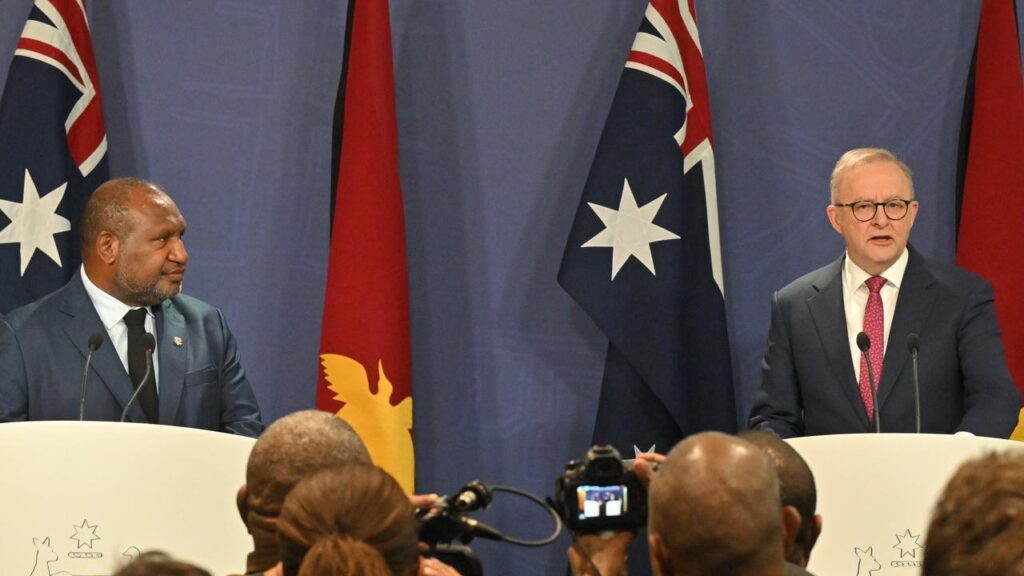Australia-Pacific ties enhanced by Labor’s election win
Ben McKay |

You can almost hear the sighs of relief across the Pacific and the Tasman.
While Pacific nations had no say in the outcome, the federal election was a sliding doors moment for Australia’s relationships with the blue continent.
Labor’s success allows a number of key Pacific collaborations will continue: the bid to co-host a climate change summit, a defence treaty with Papua New Guinea, enhanced labour mobility and visa pathways.
The region had a clear preference, according to Mihai Sora, a former Australian diplomat and the director of the Lowy Institute’s Pacific Islands Program.
“It’s not necessarily a personal affinity for for Labor or for Albanese – it’s more Australia’s Pacific policy platform,” he told AAP.
“Continuity of government represents continuity in those in those policies that are very important to Pacific countries.”
Mr Albanese and foreign minister Penny Wong have much much stock in growing Pacific relationships: visiting more often, and an uptick in bilateral agreements, including landmark treaties with Tuvalu and Nauru.
AAP’s private discussions with Pacific officials and diplomats, not authorised to speak publicly, confirmed their hopes for Labor’s re-election.

Papua New Guinea Foreign Minister Justin Tkatchenko even said as much out loud last month, telling the ABC “why would you want to change something that is working well?”.
The preference for Labor can also be attributed to Peter Dutton’s track record, which included an infamous jibe made at Pacific leaders’ expense in 2015.
“Time doesn’t mean anything when you’re about to have water lapping at your door,” he said, in a reference to rising sea levels due to climate change.
Palau President Surangel Whipps Jr, took Mr Dutton to task for these comments on a visit to Sydney during the campaign.
In New Zealand too, there was anxiety that Mr Dutton could increase levels of deportations, a long-running concern for Australia’s closest ally.
Instead, Senator Wong and Winston Peters will continue their ‘odd couple’ style pairing as trans-Tasman foreign ministers, who boast a surprisingly strong bond despite stark political differences on domestic issues.

Australia’s relationship with Papua New Guinea is primed for the biggest step-up following the May 3 election.
Mr Albanese is plainly close with PNG counterpart James Marape, walking the Kokoda Track with him last year, and agreeing a weighty deal to put an NRL team in Port Moresby by 2028.
“Australia’s relationship with Papua New Guinea is huge and has always been important (and) now the two governments are about to negotiate a defence treaty which would represent a huge elevation of security co-operation ties,” Mr Sora said.

Details of that treaty, announced late last year, remain unclear but are expected to allow Papua New Guineans to join Australia’s defence forces.
“The one thing that is missing in in the two countries’ defence or security ties is this mutual security obligation, laid out in a legal way, in an open way, and in a binding way,” Mr Sora said.
“Australia would be looking for some kind of mutual security obligation … we see that’s that sort of language in Australia’s recent treaties with Tuvalu and with Nauru.”
Mr Sora said two countries where Australia might look to improve relations during Mr Albanese’s second term with the Solomon Islands and Vanuatu.
The Jeremiah Manele-led government in Honiara, which saw off a no-confidence vote on Tuesday, is more positively disposed to China but has accepted significant Australian assistance to train police officers.
Australia also signed a bilateral security deal with Vanuatu in late 2022, but it has not been ratified in Port Vila due to a change of government.
AAP